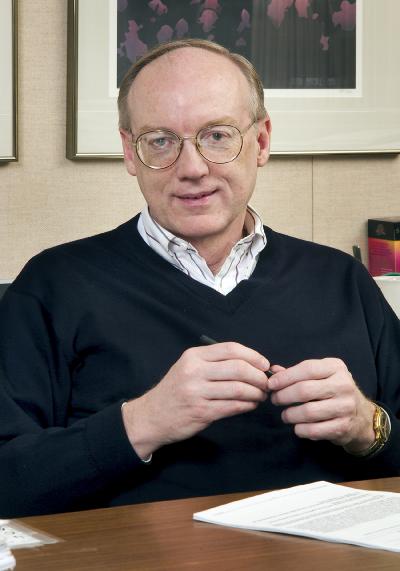May 15, 2003
Catterall selected for Bristol-Myers Squibb Award in neuroscience research
Dr. William Catterall, professor and chair of the School of Medicine’s Department of Pharmacology, has been selected to receive the 2003 Bristol-Myers Squibb Award for Distinguished Achievement in Neuroscience Research. The award, which includes a $50,000 prize, will be presented Oct. 16 in New York City, along with the distinguished achievement awards in five other areas of research.
Of the 27 neuroscientists who have won the award in the 16 years it has been given, eight, or nearly a third, have gone on to win the Nobel Prize in Physiology or Medicine. In many years, two or more recipients have shared the Bristol-Myers Squibb award.
Catterall joined the UW faculty in 1977 and has been chair of the Department of Pharmacology since 1984. He is also a national leader in promoting neuroscience research to foster new knowledge about the brain and nervous system. At the UW, he heads interdisciplinary committees that guide undergraduate and graduate educational programs in neurobiology.
He is internationally recognized for research on the electrical signaling mechanisms of nerve and muscle cells. He discovered the cell membrane protein molecules called ion channels that generate electrical signals in nerve and muscle cells and went on to describe many aspects of their structure and function. He has been a leading researcher in learning how the electrical signals from these channels are regulated by drugs and by chemical messengers such as hormones and neurotransmitters, which carry signals from cell to cell.
Regulation of ion channels is now understood to be responsible for critical aspects of learning, memory, mood, and control of other body functions.
Catterall is a member of the National Academy of Sciences, the Institute of Medicine, Academia Europaea and the American Academy of Arts and Sciences. He has received several major awards for his research, including the Passano Award and the American Heart Association’s Basic Science Prize.
One of the 27 earlier winners of the Bristol-Myers Squibb Award for Distinguished Achievement in Neuroscience Research is Dr. Bertil Hille, UW professor of physiology and biophysics, who is also known for his work with ion channels. Other UW faculty members have received the Bristol-Myers Squibb awards in other categories.
The neuroscience research award was established in 1988 as part of a no-strings-attached research grant and award program, and is given to scientists who have made unique contributions to central nervous system research. Selection is made by an independent peer-review committee of leading neuroscientists who participate in the company’s unrestricted research grant program.



